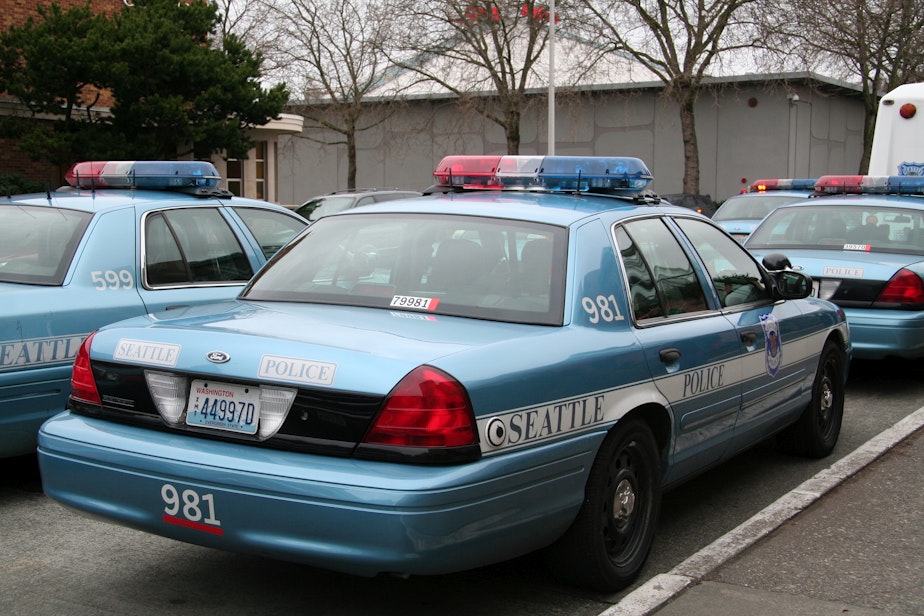What the new Seattle police contract does and doesn't do for oversight

Seattle’s Inspector General says she’s ready to start her work under the new police labor contract. But it’s left some open questions about her role.
Lisa Judge was hired to be Seattle’s first Inspector General earlier this year. She’s been working from a vacant space in the basement of City Hall that used to house a credit union.
Judge said she used this time to observe, but “it was reaching a point where I think we were beginning to hit some roadblocks and I’m very pleased that those roadblocks have been removed and we can get on with our work."
That includes attending internal reviews of cases where police officers used force against someone. But Judge said the contract with the Seattle Police Officers Guild doesn’t make clear whether she can attend as an observer, or as a participant.
“I think it is really essential that my office be allowed to ask questions,” she said. Judge said the guild may file a grievance about her presence in these meetings.
The contract omits Judge from the list of people who must be notified if the police chief reverses a misconduct finding against an officer, like the cases that came to light in 2014.
Andrew Myerberg, the director of the Office of Police Accountability, must be notified if disciplinary findings are changed. He said he’ll alert Judge, the Community Police Commission, and otherwise make that notice public. But he believes Chief Carmen Best will also notify stakeholders even though it’s not required under the contract.
Sponsored
Judge said she would look at the big picture at the department, auditing departments including the Office of Police Accountability, and spotting larger trends.
Myerberg said his office will continue to investigate complaints of officer misconduct. The new labor contract will allow him to hire two civilian investigators to work alongside sworn officers.
Myerberg said both types of employees bring important skills and perspectives.
“I’m really excited about the civilian investigators and not because they’re civilian versus sworn. I very much value the sworn -- our sworn investigators work incredibly hard in a job where at times they’re not trusted by either their own coworkers or the community.”
Myerberg said Seattle may be unique nationwide in having a “hybrid” office where civilians and officers together investigate police misconduct. In general he said he favored approval of the labor agreement, citing low morale at SPD from going years without a contract while revamping training and procedures to comply with the federal consent decree. U. S. District Judge James Robart said he will scrutinize the new contract to make sure it doesn’t conflict with goals to prevent excessive force and biased policing.
Myerbeg and Judge said the court will likely examine new language around the burden of proof needed to terminate and officer for certain types of "stigmatizing" offenses.
Sponsored
Judge said she also expects the city to re-open negotiations with the Seattle Police Officers Guild on policies around moonlighting by officers, which was the subject of an FBI investigation and an executive order by then-Mayor Tim Burgess. The contract doesn’t implement any changes on that issue. Judge said another concern is the lack of subpoena power for her office. Judge said SPD now appears to be a willing partner in her investigations, but under future administrations an Inspector General could have problems getting the records they need.
“Secondary employment is certainly an issue that the city of Seattle and SPD need to address in a way that inspires confidence in the community,” she said. “I would certainly hope that would be on the table. Also the subpoena issue in the event that we don’t’ have such a cooperative administration.”
Myerberg said one of the shortcomings in the contract, from his perspective, is the lack of ability for his office to take a role in coordinating criminal investigations of police officers. He said he's not seeking to perform those investigations, but have input so they don’t undermine a subsequent inquiry by his office.
“I would like more transparency in criminal investigations. I would like to know what’s going on and coordinate more,” he said. “However, at the end of the day we’re going to do what the contract says.”
In the meantime, Myerberg said he’s been attending roll calls at different precincts to take questions from officers. He said it’s not always friendly, but he believes it breaks down barriers and improves communication.
Sponsored
“If they know me and they see me and they interact with me, it’s harder to view me as this irrational bad actor in an ivory tower that’s opining over their cases,” he said. “But I think as a function of those I’ve looked in the eyes of officers that – it sounds odd but – they want me to tell them that it’s going to be okay. They love their job.”
The Seattle City Council approved the contract this week. But the Community Police Commission and many community groups urged them to vote down the contract, saying its provisions fall too far short of the city’s accountability legislation passed last year.




